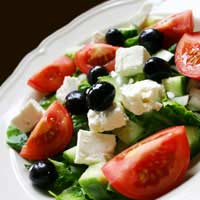Nutrition Advice for Healthy Bones and Joints in Retirement

Healthy bones and joints are an essential part of staying mobile in later life. This can be largely affected by your diet and lifestyle choices earlier in your life, but fortunately, it's not too late to start redressing the balance. Taking in the right nutrients from your diet can go a long way towards improving the state of your bones and joints, and prevent problems further down the line. A balanced diet promotes a healthy bone mass and strong bones, as well as improving recovery after fractures. It also reduces the chances of having a fracture reoccur. If you've already run into problems in this area, some nutrients can help fractures to heal more quickly.
Calcium
Most of the calcium in your body is contained in your bones. Your bones retain calcium, which maintains the blood's calcium levels. This has a positive effect on your muscles and nerves. As calcium absorption declines as you get older, you need more calcium to have the same effect. This is particularly important for post-menopausal women. Experts suggest that this group need around 1200mg of calcium every day.
Foods that are good sources of calcium include:
- Milk
- Yogurt
- Ice cream
- Cheese
- Salmon and sardines (with bones)
- Dark green vegetables
- Dried beans
- Calcium-fortified orange juice, cereal bars and fitness water
Vitamin D
Vitamin D has an indirect effect on the health of your bones, as it aids calcium absorption.
Good sources of vitamin D include:
- Direct sunlight
- Liver
- Fish liver oils
- Oily fish
- Egg yolk
Vitamin A
Vitamin A can reduce bone fractures, but be careful not to take too much, as it can be poisonous in large amounts.
Good sources of Vitamin A include:
- Liver
- Carrots
- Mangoes
- Spinach
- Cantaloupe melon
- Dried fruit
- Milk
- Egg yolk
- Mozzarella cheese
Vitamin C
Vitamin C is an antioxidant, and it can play a big role in keeping bones healthy.
Good sources of Vitamin C include:
- Citrus fruits
- Strawberries
- Broccoli
- Brussel sprouts
- Peppers
- Cantaloupe melon Potatoes
Vitamins A, C and E
This combination of vitamins is needed to help prevent joint trouble. Fruit and vegetables contain a range of vitamins.
Magnesium
Good sources of magnesium include:
- Wheat bran
- Nuts and seeds
Phosphorous
Good sources of phosphorous include:
- Wheat germ
- Bran
- Nuts and seeds
- Cheese
Ginger
This spice can help to improve the health of your joints.
Things to Avoid
There are several lifestyle factors that can have a negative effect on your body's absorption of these vitamins and minerals. These include:
- Drinking alcohol
- Drinking tea and coffee
- Smoking
Drinking tea and coffee is acceptable, but leave an hour either side of meals, as drinking it close to or with meals containing vital vitamins and minerals can result in them not being properly absorbed into your bloodstream. This effectively means that you might as well not bother incorporating them into your diet, as your body won't fully benefit from them. In some cases, your body may not feel any benefit from them.
Making sure that you get enough of the right vitamins and minerals to keep your bones and joints in the best possible condition is fairly simple and can make a big difference to the state of your bones and joints, and your body in general. You can take supplements, but many experts suggest this only as a last resort, as they see 'the real thing' as the preferable option.
- Dealing With Incontinence
- Dealing With High Blood Pressure
- Coping With Alzheimer's Disease
- Reducing The Risk of an Accident In The Home
- Taking Care of Your Eyesight
- Coping With MS
- Coping With Arthritis
- How to Effectively Cope With Osteoporosis
- Keeping Elderly Joints Supple
- Using Supplements (eg Cod Liver oil) in Old Age
- Hip Replacements


Re: Coping With Alzheimer's Disease
Since manuscripts are subject to deterioration
Re: Coping With Alzheimer's Disease
book about the chess of love ", created by
Re: Financing and Grants for Home Mobility Equipment
My partner is suffering from copd, sarcoidosis, bronchiectasis and pulmonary fibrosis.. She is finding…
Re: Financing and Grants for Home Mobility Equipment
Hi I have lost the use of my right hand which had operations for carpal tunnel trigger finger seemingly…
Re: Financing and Grants for Home Mobility Equipment
Hello my dad get a mobility car to help get around, He wounding do you think he could get a mobility…
Re: Financing and Grants for Home Mobility Equipment
My problem is both my Knees have failed there MOT,I spent 11days in Hospital as I couldn't Put any…
Re: Financing and Grants for Home Mobility Equipment
I was diagnosed with Fibromyalgia over 23 years ago. Nobody believed me, my children as well as doctors.…
Re: Financing and Grants for Home Mobility Equipment
I have been trying to get help for a bath put In I carnt get none anywere I cannot use the shower it…
Re: The Benefits of Keeping an Active Mind
sir ,my mind remmber well about some time not remmber any thing what process that wi;ll i do
Re: Financing and Grants Available for Transport In Retirement
My dad keeps losing balance on his legs done have much money he needs a mobility scooter…